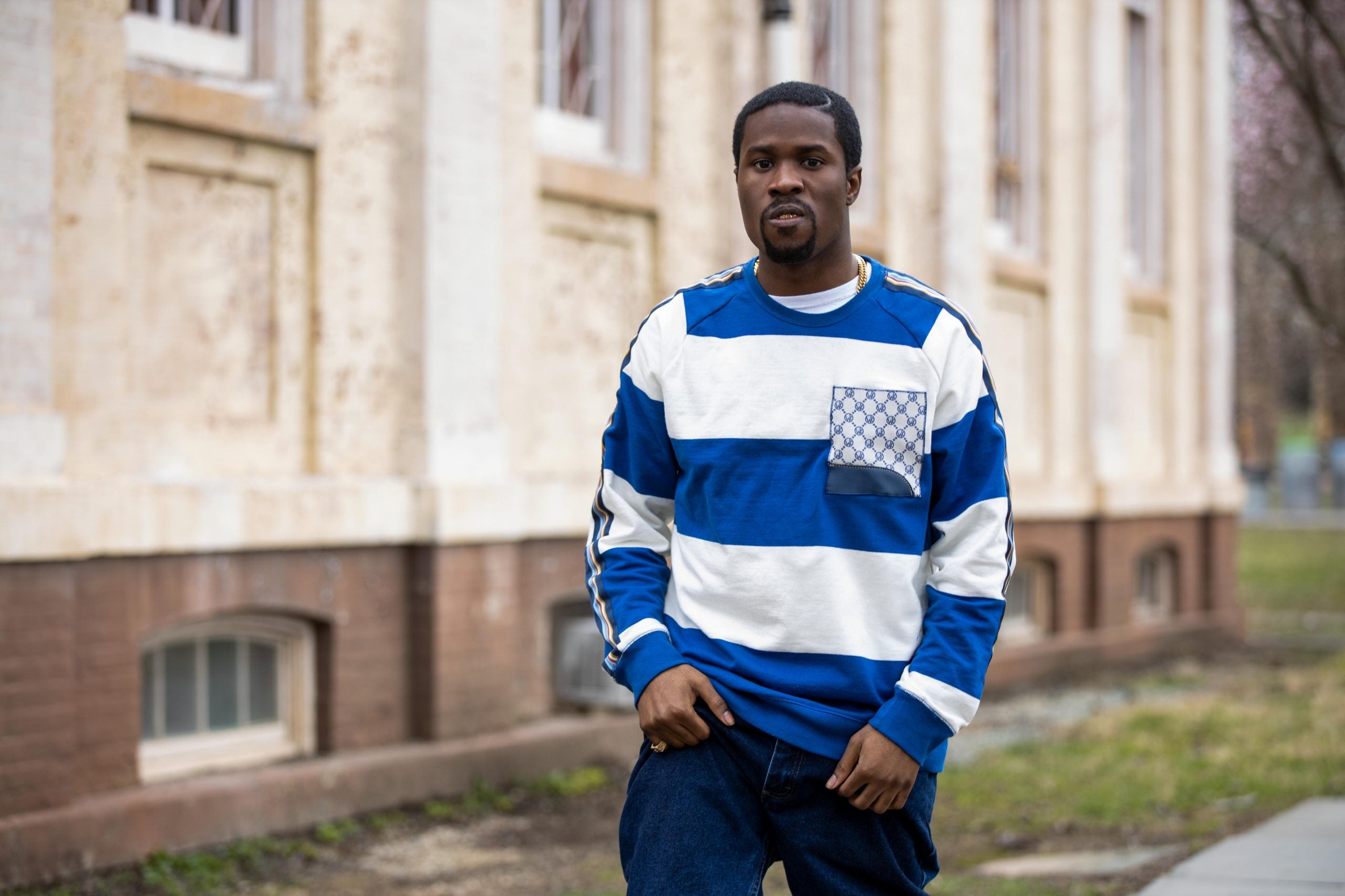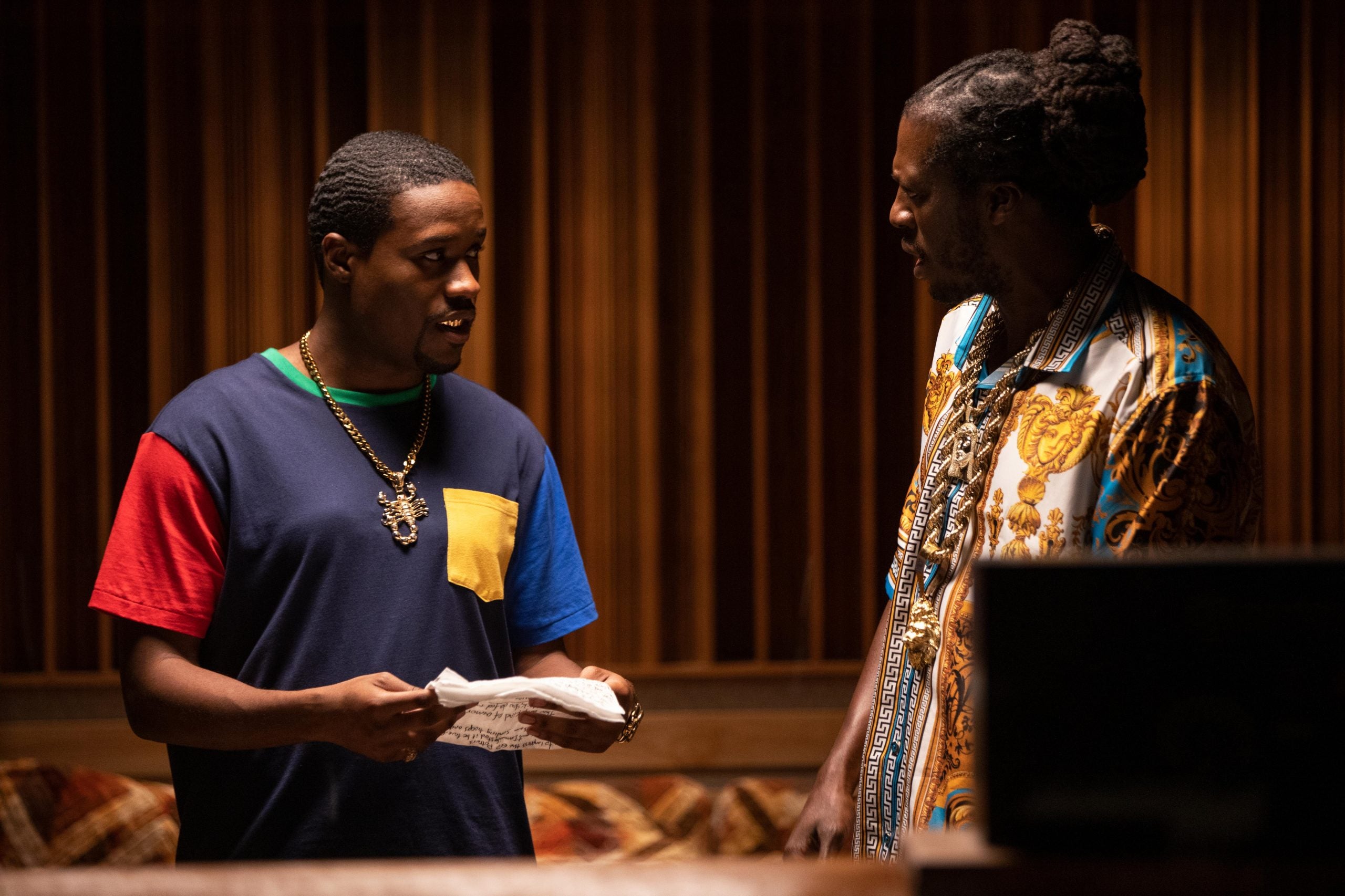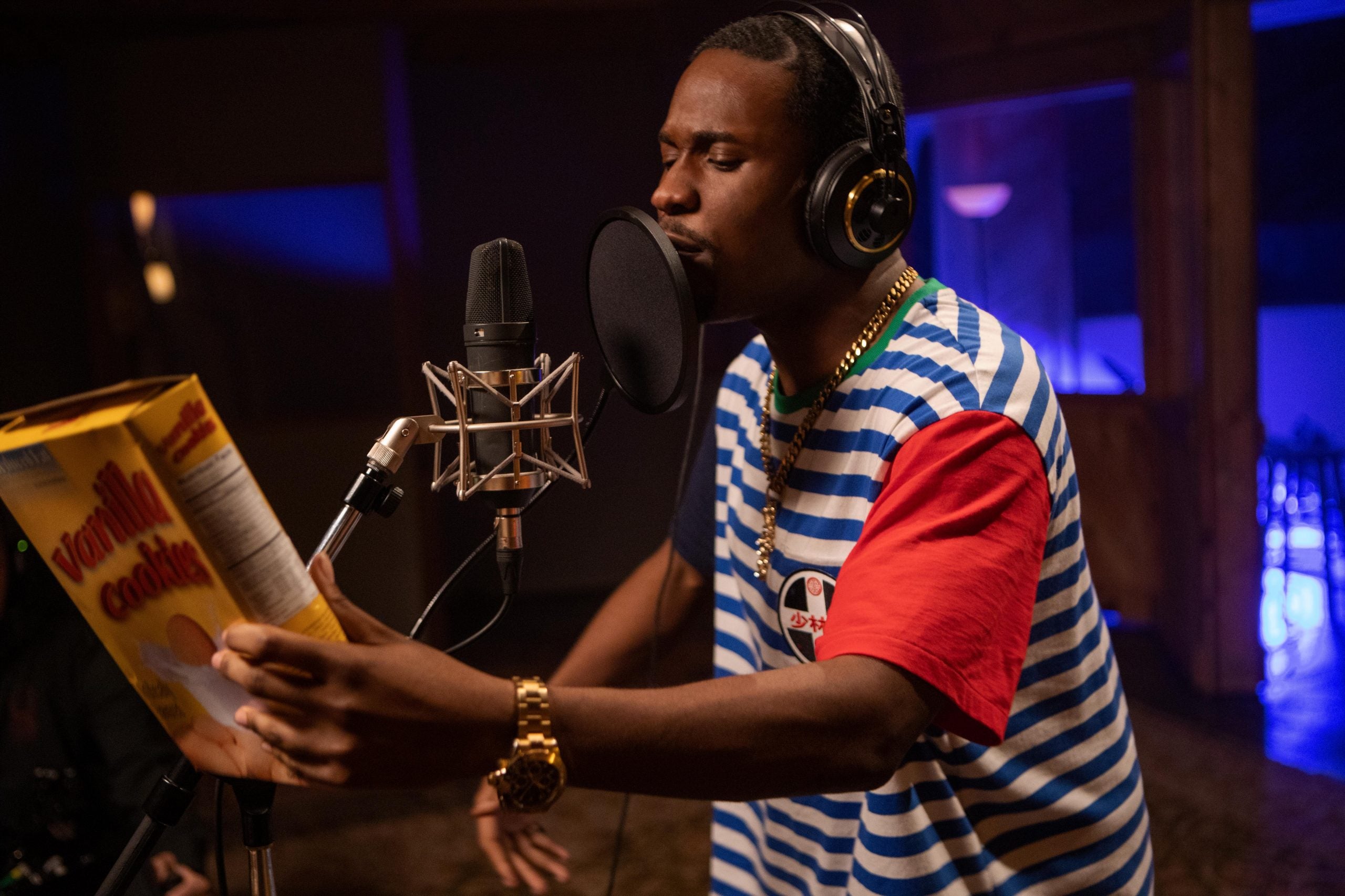
It’s one thing to tell Black stories, it’s another thing to tell them right. Wu-Tang: An American Saga, executive produced by two of the iconic rap group’s members, RZA and Method Man, is a show that does its subjects justice.
The second season of the highly anticipated Hulu series picks up in the early ’90s, at the peak of the rise of hip-hop and the crack cocaine epidemic, as the vision of Bobby Diggs (played by Ashton Sanders) leads to the cultivation of one of the greatest hip-hop groups of all time. Featuring an all-star cast including Zolee Griggs as Shurrie and rapper Dave East as Method Man, Wu-Tang: An American Saga was critical acclaimed for truthfully and authentically dissecting the stories of each of the group’s members.
“I think the show is taking this opportunity to really give their perspective and have a message in what we’re doing,” Shameik Moore, who plays Raekwon, told ESSENCE. “We know Wu-Tang to be real rugged, rock gritty, and it stays that way, but it slowly transitions to having that sweet message of Black boy joy, and focusing on music and getting out of the situations we don’t want to be in anymore. Coming together, having more power together than separately, and lots of [more] great messages in there. Hopefully, it’s inspirational to the community.”

Not only is Moore taking in the excitement around Wu-Tang, he’s also working on part two of Spider-Man: Into the Spider-Verse with co-star Issa Rae as Jessica Drew, also known as Spider-Woman. The sequel is set to be released next fall. “As far as coming back for a second one, it’s a great opportunity,” Moore said. “I’m so thankful to be coming back again.”
Below, check out our full interview with Moore as he talks about these major roles and how Wu-Tang influenced his own passion for music.
ESSENCE: As an actor, why is it important for you to be a part of projects like Wu-Tang: An American Saga?
Shameik Moore: Representation is important and entertainment is important just for getting pulled out of maybe your day-to-day issues, dramas, or hurdles; it just allows some joy and some love to come in. Stories like this are important to share for the purpose of understanding, having clarity, perspective on other communities. You could grow up in a whole different way, you’ll still be Black, and you look at the show Wu-Tang and you have a new understanding of why people may make the decisions that they make, and how you get past it. Not being a victim of your surroundings like coming from the hood, not having an option, and having to make drugs, and then sell it. Then choosing to leave all of that behind and do music which is making no money at the moment and believing in it – that takes heart, faith, and ambition.
It’s important for me to tell that story, being involved with that story or any stories. Not just stories like this, but even the opposite of going to college or applying for Harvard, like in Dope. There are so many different stories to be told. Your question is how important is it? It’s very important. Representation is important, and I intend to keep my resume entertaining over these next 80 years.

ESSENCE: How has this particular project challenged you as an actor? What creative process did you have that may have differed than anything else you’ve ever done?
Moore: This is so far, I’d say playing Raekwon is the most, what I would call, “bad boy character.” At first, it was Shaolin Fantastic in the Get Down, now I definitely think Raekwon is more of a gangster character. With that being said, playing someone that’s still alive that you could meet today, see perform today, or watch today, it’s important to be as authentic as possible to his energy and how he moves. I think that’s the biggest task.
Obviously, Wu-Tang [Clan] is an iconic group, so there’s a lot of hardcore fans that have expectations of authenticity. Then there’s the rest of the world that knows of Wu-Tang that might not be from that generation [and] doesn’t really know the effect Wu-Tang really had on the rap game. They might’ve just been like me like, “I know Wu-Tang. I see the W, I see the match, I know they’re important, but I don’t know why.” It’s important for me to represent Raekwon in that way, too. When they look at me and they see Raekwon, I got to represent it the way that he was representing it back then, requirements for the streets.
ESSENCE: How has Wu-Tang Clan influenced your passion for music, as well as Black culture and hip hop at-large?
Moore: As far as me, I think it made it okay. Me being Raekwon makes it okay for me to do more rapping in my music. At first, I was definitely more, lovey-dovey, very relationshipy in my music. I know my music is not out yet, but with my project about to drop now, it’s like half of it is very lovey-dovey R&B, and the other half, I turn up a little bit. Wu-Tang was good for that as far as that goes.
The culture wouldn’t really be the same without Wu-Tang. There are always big moments in the industry that were defining and set the bar, you know what I mean? Wu-Tang was that forever and the culture has still been affected and has this appreciation for them.
ESSENCE: What came first in your life – music or acting?
Moore: I started dancing first and then it went to music. Acting was this thing that happened from the dancing. I went on a bunch of video shoots and I ended up getting in the video and those castings, but I was only able to get in because at 12 years old, I would walk up to people with no fear, just talk and do what I like. It was networking, but I wasn’t really knowing that that’s what it was called. I was just like, “I want to be in the video.” “Okay. Will you stand over there?” I’ll stand over there, but when this music coming on, I’m going to come dance for you.
I would say whatever, people would think it was cute and laugh or whatever my dad or my mom would be in the car, letting me do whatever I’m doing on the set. I end up in the music videos, and then there would be this one audition after the next. Eventually, I ended up on TV as an actor, and then agents wanted to represent me. I ended up choosing an agent and the next thing I know I’m in Dope. Meanwhile, while I was doing those auditions, I was performing all over [Atlanta’s] DeKalb County between 14 and 16 middle schools and high school. It’s an interesting story, but the music was happening first and the acting just took off. It seemed like I needed to focus on that even though my heart was always with the music so, here we are.

ESSENCE: If you could describe your sound, what would it be?
Moore: I’m an all-around artist. I don’t even like to just say, “I’m a musician, I’m a singer, I’m a rapper” now because it’s not a “now” thing or a “then” thing. It’s like an all-around thing. My biggest inspiration is God, the creation of Earth, the world, the universe. I’m made in His image and I just love the idea of creating things.
When you ask about my sound and this first album, the first half is very relationship-focused. You meet the girl, you decide whether or not you want to be in a relationship, you tried it out, et cetera. The second half is, “I’m still young, but I don’t know if I trust this person. I really want to put love into myself instead of other people, even though I like this one girl but there are many.” I go into the more hip-hop Raekwon energy on the second half. My sound is a mix of R&B and hip-hop. My family’s from Jamaica so, at some point, I’ll definitely tap into those roots.
ESSENCE: When it comes to Into the Spider-Verse, what are some of the major challenges in voiceover acting versus onscreen work?
Moore: On screens, you get to use your body. When you think about Raekwon vocally, I try to match his pitch, but his actual rasp with his voice is different than the rasp in mine. His voice sounds different than my voice does. If I was playing him, just through the voice, I don’t know that I would be as convincing as Raekwon. I can put it on and you don’t notice it on camera because everything else is Raekwon. The walk and the energy, how they dressed me, the set design, and et cetera, the other characters around me – everything is Raekwon. Versus Into the Spider-Verse, I have to put it all on.
You have to feel happy, you have to feel sad, you have to feel anxious, you have to feel every emotion that the character is feeling just through the voice. It’s a different assignment, but it could be seen as being less difficult because doing actions on camera is not easy either. It’s really dependent on what scene that we’re working on. If I have to cry as Miles, we have to get there somehow and if I have to cry as [Dope character] Malcolm [Adekanbi], you really have to see tears come out of my eyes. There are two different approaches. It’s easy to be happy as Miles. I like to think that I’m a happy person so, doing straightforward things are pretty easy with voiceovers, but when it’s time to really make someone feel something, I find myself doing actions as if I’m on-screen to help me be convincing.
ESSENCE: What projects do you want to work on in the future and in an ideal world, what would be the perfect role for you?
Moore: The best role that I’ll ever have is the one that I’m writing and creating In-house. I’ve always said, I feel that we need new superheroes and characters. I don’t want to be a Black 007. I want to create a whole new character that is Black, that is fire, inspirational, or whatever it is. I don’t want to be the Black this or the Black that. I want to create new movies, new characters.
I want to combine a couple of genres and do some cool things. I love mysterious movies. I love thrillers, like old school ’80s and ’90s thrillers. They don’t even make movies like those anymore – Red Dragon, Fatal Attraction. Those are the kind of movies that really get my energy in there. Obviously, I love movies like The Matrix, the whole Harry Potter series, Jason Bourne. The movie I’m talking about making has a lot to do with all of those movies I mentioned. I’ll really combine these cool genres that really take it there for me and I’ll be original.
